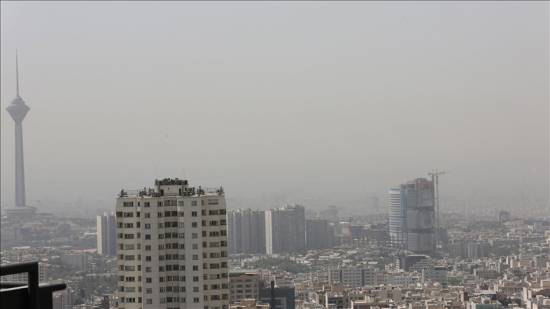Poor air quality forces closure of schools, government offices in Tehran
Educational institutes and government offices in Tehran and other Iranian cities were forced to close on Monday over the deteriorating air pollution in the country.
According to the Tehran Air Quality Control Company, the air quality index (AQI) in the city was recorded at 116 on Monday, deemed unhealthy for all sensitive groups.
Since the beginning of the year, Tehran has had 63 days of acceptable air, four days of unhealthy air (for all people), 34 days of unhealthy air (sensitive groups), two days of dangerous air, and two days of clean air, the company said.
It's the second time since April that schools and government offices have been shut in Tehran due to worsening air quality fueled by severe sand storms.
All sports venues across 22 districts of the capital were also closed for activities.
On Sunday, for the fourth time in the current Iranian calendar year that starts March 21, Tehran became the most polluted city in the world, with an alarming dip in the air quality index.
IQAir, the Switzerland-based air quality technology firm, announced that the air quality index in Tehran was 277 units.
The problem of sand storms in Iran has taken an alarming turn in recent months, with authorities saying they originate in neighboring countries such as Iraq and Syria.
"It's become worse in the past few months so much so that at times things are barely visible beyond 50-60 meters," said Amir Saedi, a trader in downtown Tehran.
For Alireza Hashemi, a Tehran-based university student, the scourge of air pollution was assuming alarming proportions, making it difficult to walk out without protective masks.
"Even with COVID-19 ghosts going away, we still cannot afford to give up masks," he said.
Mohammad Darvish, a leading Iranian environmentalist, told Anadolu Agency that the region's population growth rate has seen a "four-fold increase" in recent decades, which has compounded environmental woes as well.
He also attributed it to "global climate change" with many lakes and rivers drying up and the phenomenon taking a heavy toll on the environment.
The third factor, he said, was that some regional countries were "unable to properly address environmental issues,” citing the cases of Iraq and Syria, where "years of war and chaos" has diverted attention from environmental issues.
"Governments in the region cannot tackle haze unless they adopt a water policy that prioritizes environment over agricultural and industrial sectors," he asserted. "Environment can be a field of cooperation between regional governments."/aa


